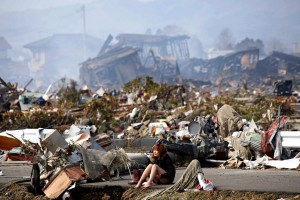
The earthquake and tsunami that struck Japan earlier this month uprooted homes and killed thousands, leaving many more missing. The tragedy left the nation paralyzed in ruins. Photo courtesy of nytimes.com
The earthquake and tusnami that struck Japan on Friday, March 11, has been called Japan’s worst crisis since World War II. It has left 9,500 dead and another 16,000 missing. Around the world, people are mourning this extraordinary death toll and stepping up relief efforts to help the survivors.
Within the UR community, the tragedy has also had an impact on faculty, students and staff, some of whom were directly affected by the event.
Senior Lecturer in Japanese Mariko Tamate has numerous relatives in Miyagi, one of the hardest-hit prefectures. She wrote on the Modern Languages and Culture blog on Wednesday, March 16, “Today I finally have news to share about my relatives there. One of my father’s seven siblings in Miyagi Prefecture and his wife have survived the quake. According to [my uncle], my other relatives should be all right, because they are mostly in the mountains.”
Up until last week, senior Kohei Mahano had no idea if his grandparents living in Miyagi had survived the tsunami and was unable to contact them as phone lines were out. Fortunately, news of their safety came a few days later.
For many, communication breakdown posed the most concern, as people could not ask for help or find out if their loved ones were safe.
Adding to the precarious state of Japan is the failure of the reactors at Fukushima Daiichi power plant, which resulted in leaked radiation. Research professor of the Radiation Oncology department Jacqueline Williams is leading research at the University on radiation exposure treatments. The project, which has been going on for six years, is now receiving attention for its applicability to the unfolding crisis in Japan.
The tragedy has also disrupted the plans of students who were scheduled to leave on Friday, April 1 for their study abroad programs in Japan. Junior Cihangir Okuyan was set to spend his spring semester at Meiji Gakuin University in Tokyo, but found his program canceled due to the state of uncertainty in the country.
“Although I am sad that I will no longer be able to go to Japan, it was probably the best choice, since there is news of another earthquake coming to Tokyo or somewhere near Tokyo,” Okuyan said.
President Joel Seligman has confirmed that UR students in Japan are “safe and accounted for,” as well as the alumni of the William E. Simon School of Business Administration and the school of Medicine and Dentistry.
Just as affected were students who took to Japan as a study area of interest. Senior Catherine Steele, majoring in Japanese, studied there in the Spring of 2010 and became acquainted with many people from Japan. She had heard first about the earthquake from her boyfriend, who lives in Tokyo.
“When I heard this, I immediately imagined that his house was destroyed, his family and many of our friends dead, but he reassured me that Tokyo seemed to be doing fine,” Steele said. “It’s heartbreaking, because I love Japan, and there are so many people I really care about whose safety is still in question.”
Steele was also frustrated by the dichotomy between the Japanese and Western presses on the way they disseminated information on the tragedy.
“The worst thing is that, as far as the news goes, you have no idea what to believe,” Steele said. “Between the utter calm of the Japanese press and the hysteria of American and European presses, you feel as though people are either trying to feed you lies or sell you newspapers.”
As relief efforts intensify from organizations like the American Red Cross to celebrities like Lady Gaga, groups on campus are also showing their support for the cause. In particular, students from the Anime Interest Floor and the staff from the Reference Department of Rush Rhees Library will be setting up a table at Gleason Library on Thursday, March 24 to collect donations.
In light of the tragedy, Hope Force International (HFI), an organization for training and mobilizing volunteers to respond to natural disasters, has finalized plans to conduct Disaster Response training in Rochester. They are scheduling their first disaster relief training seminar in New York from May 12 to 14. Currently, HFI has teams on standby and ready to assist with the crisis in Japan.
As the death toll continues to soar, people around the world pray that Japan will recover from the paralyzing effects of the tragedy.
Lim is a member of
the class of 2014.
